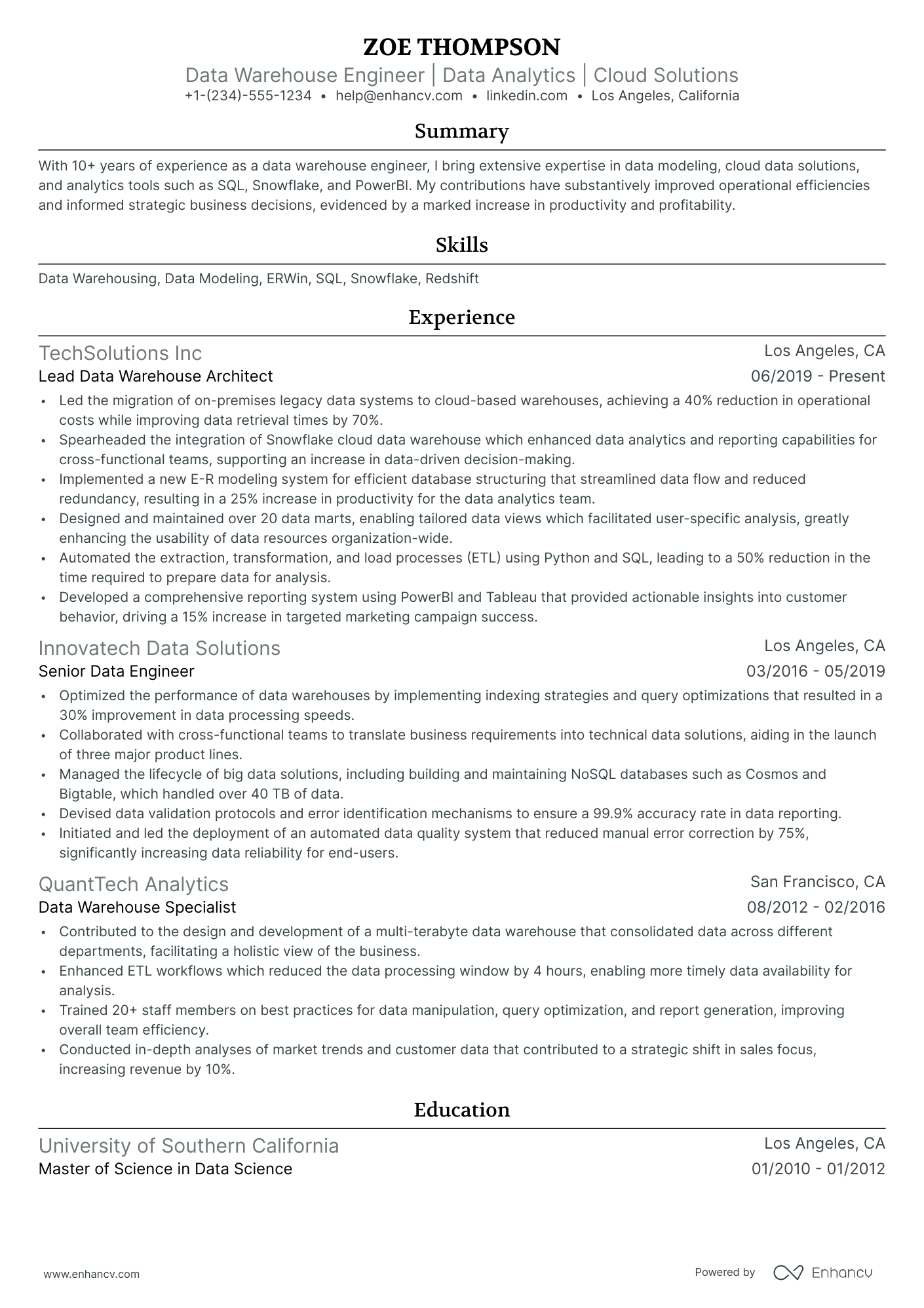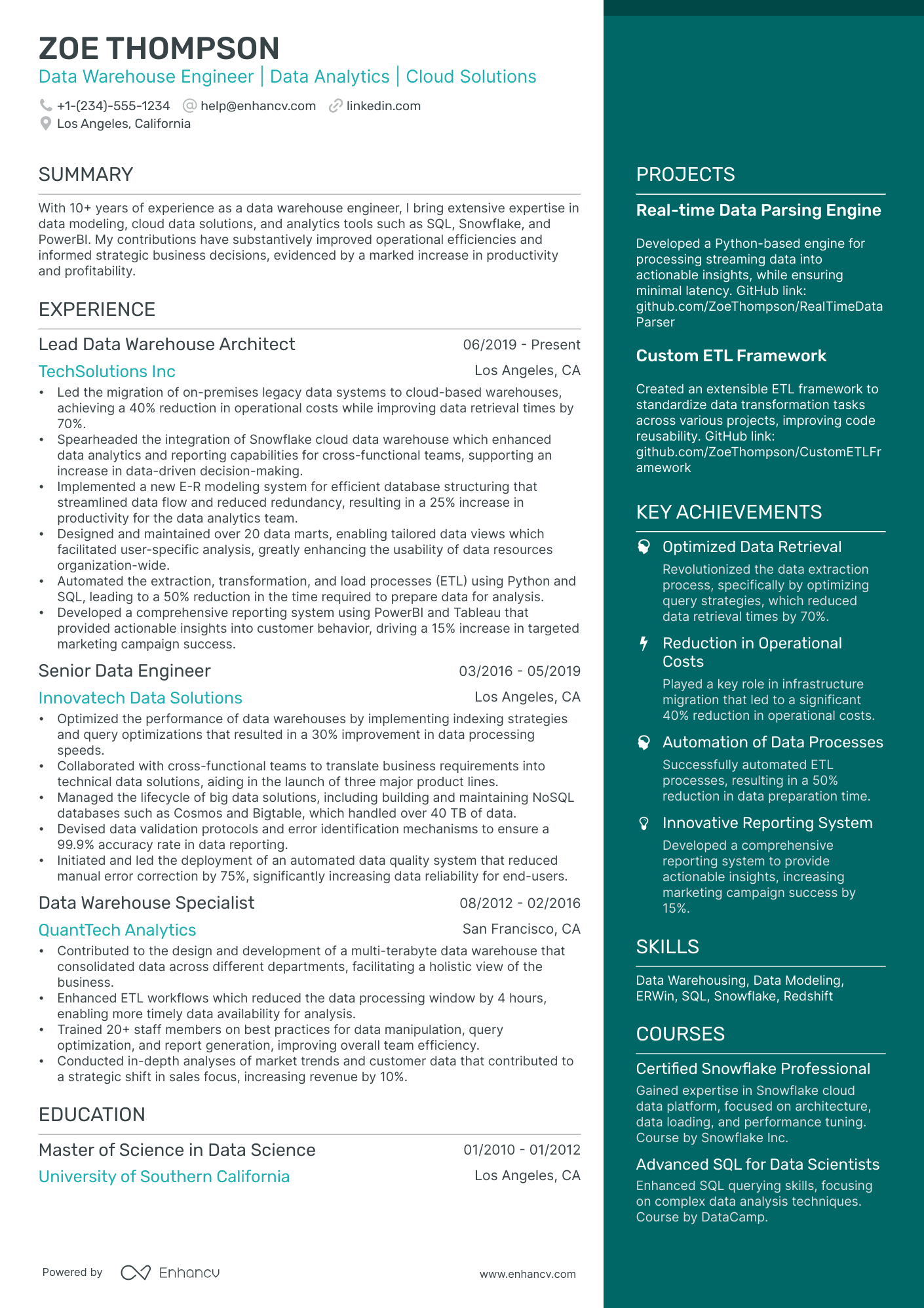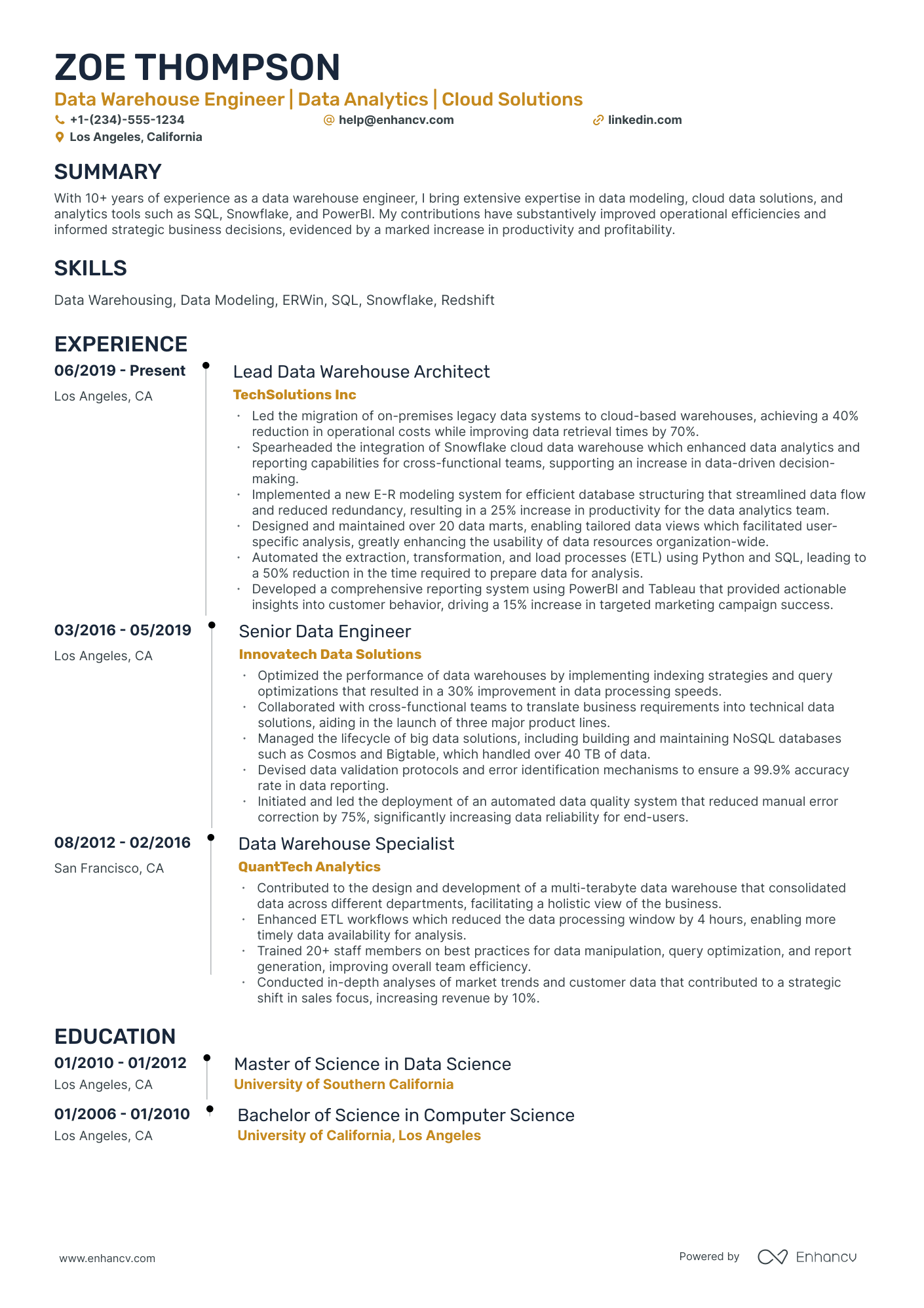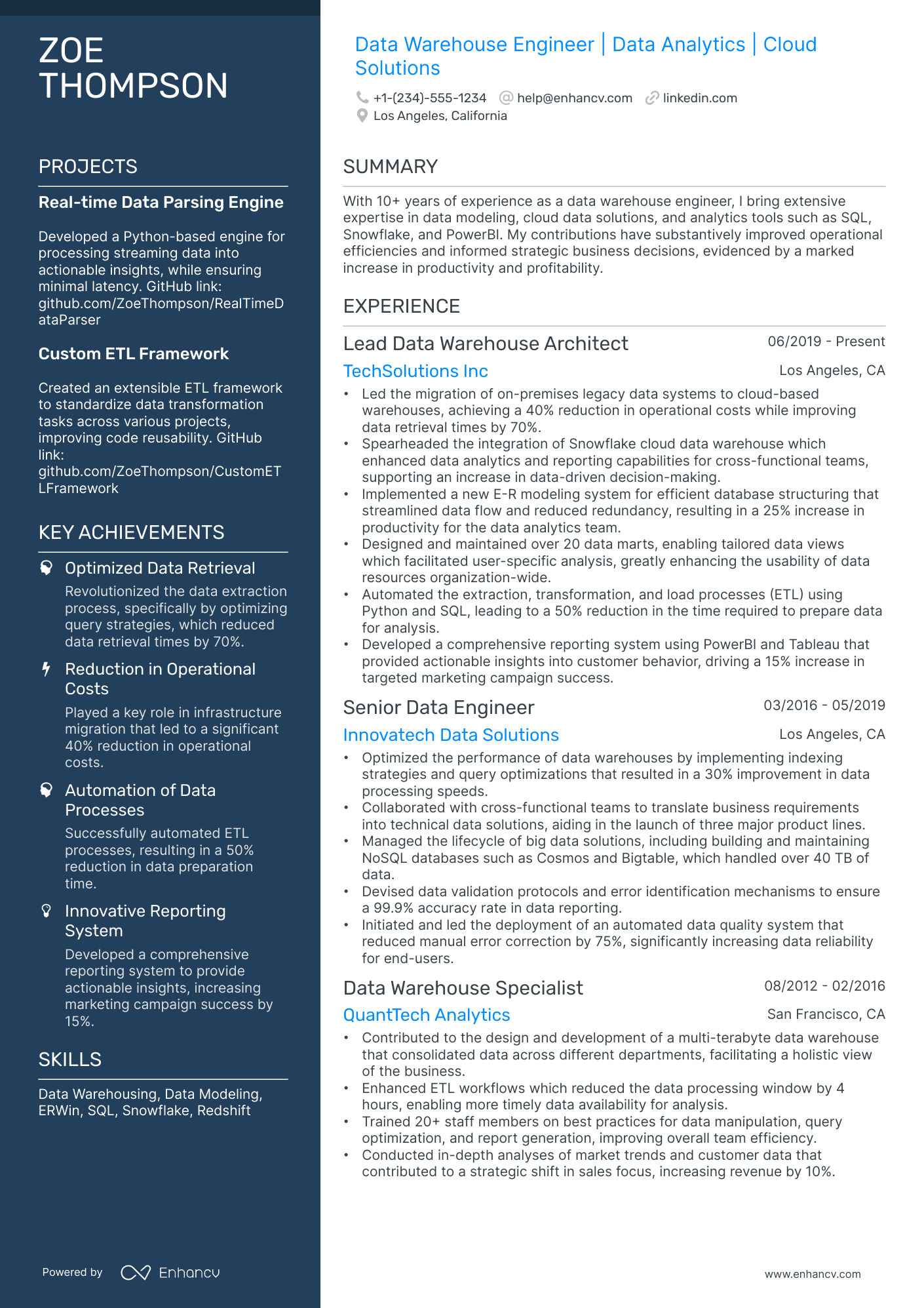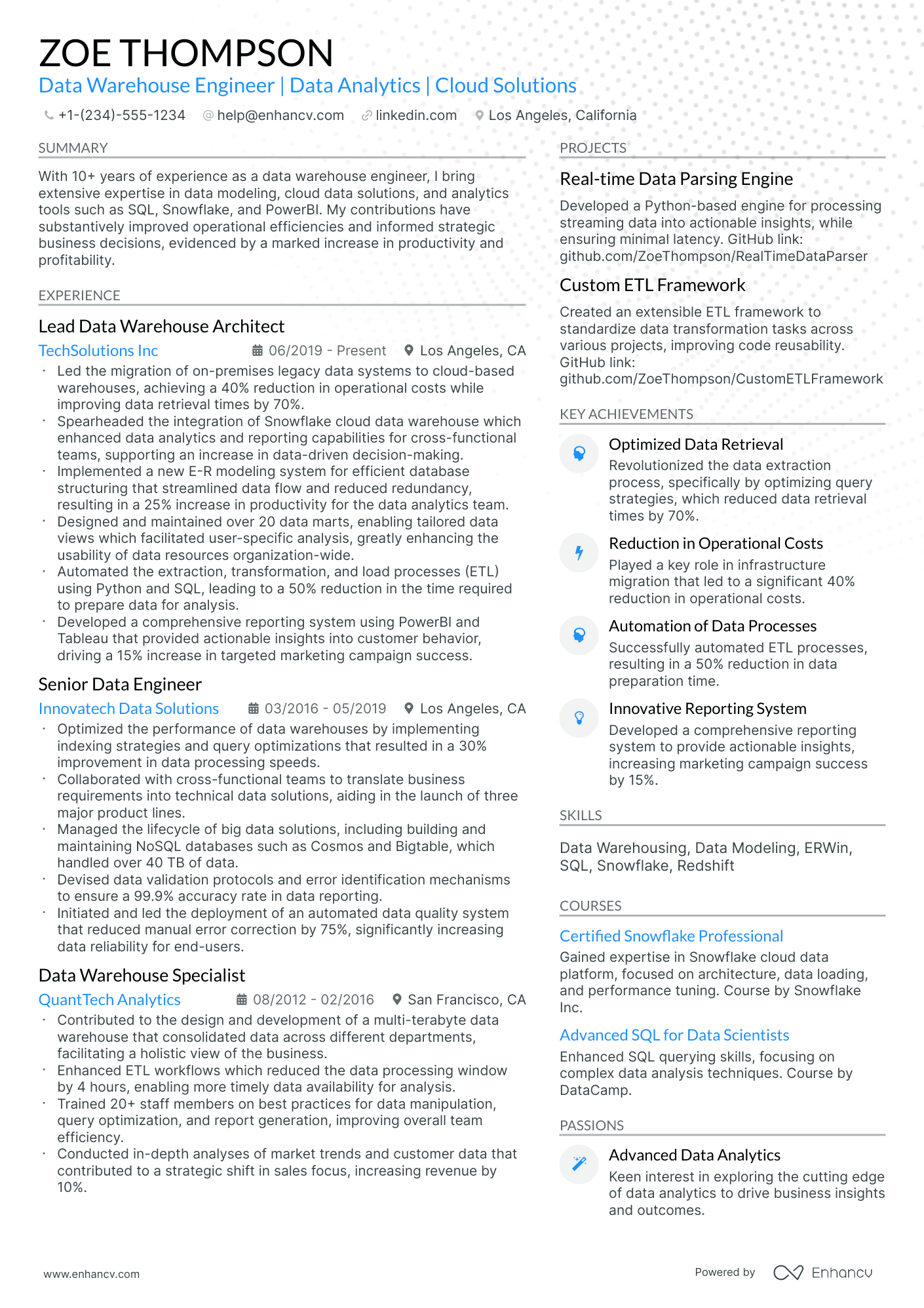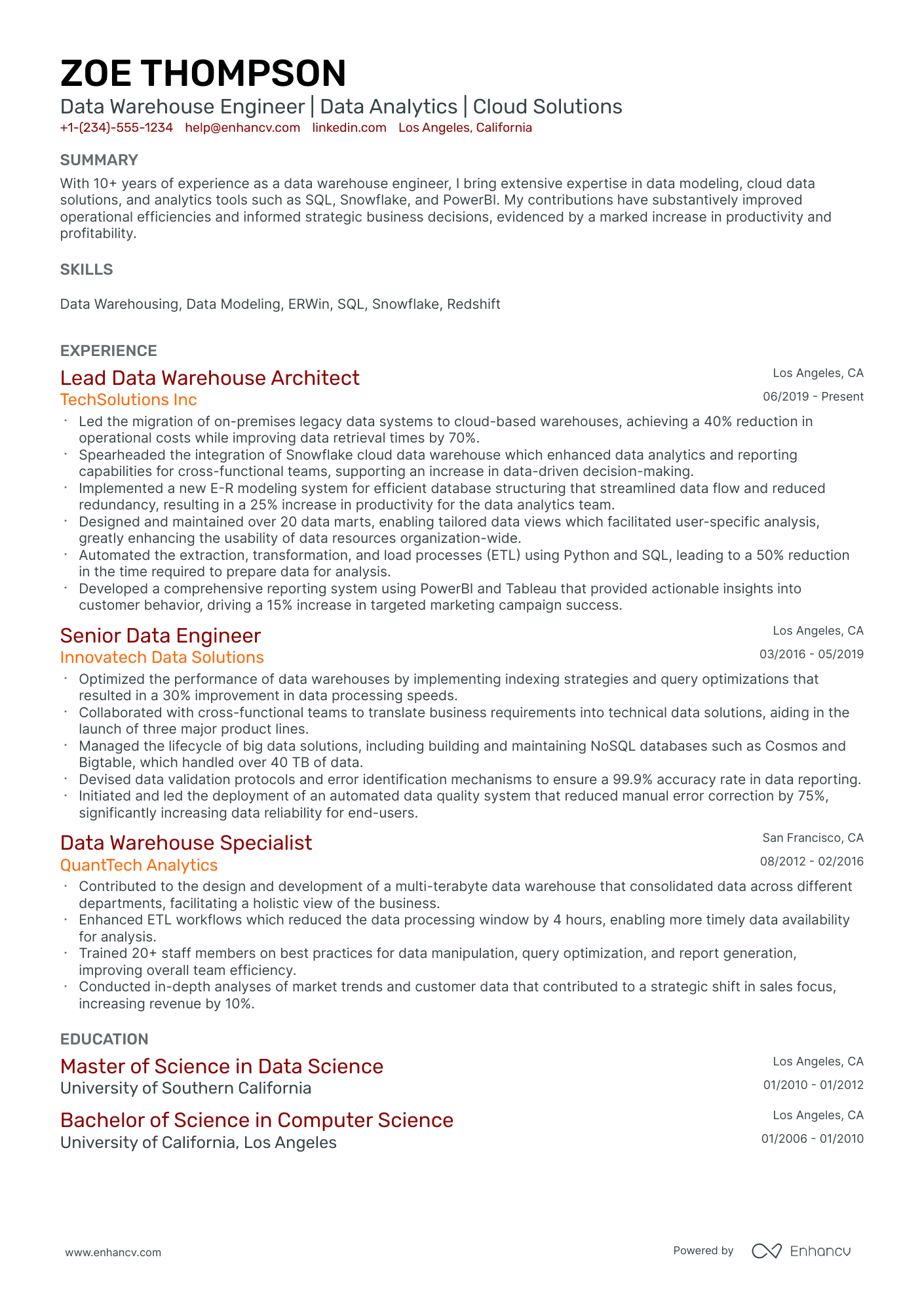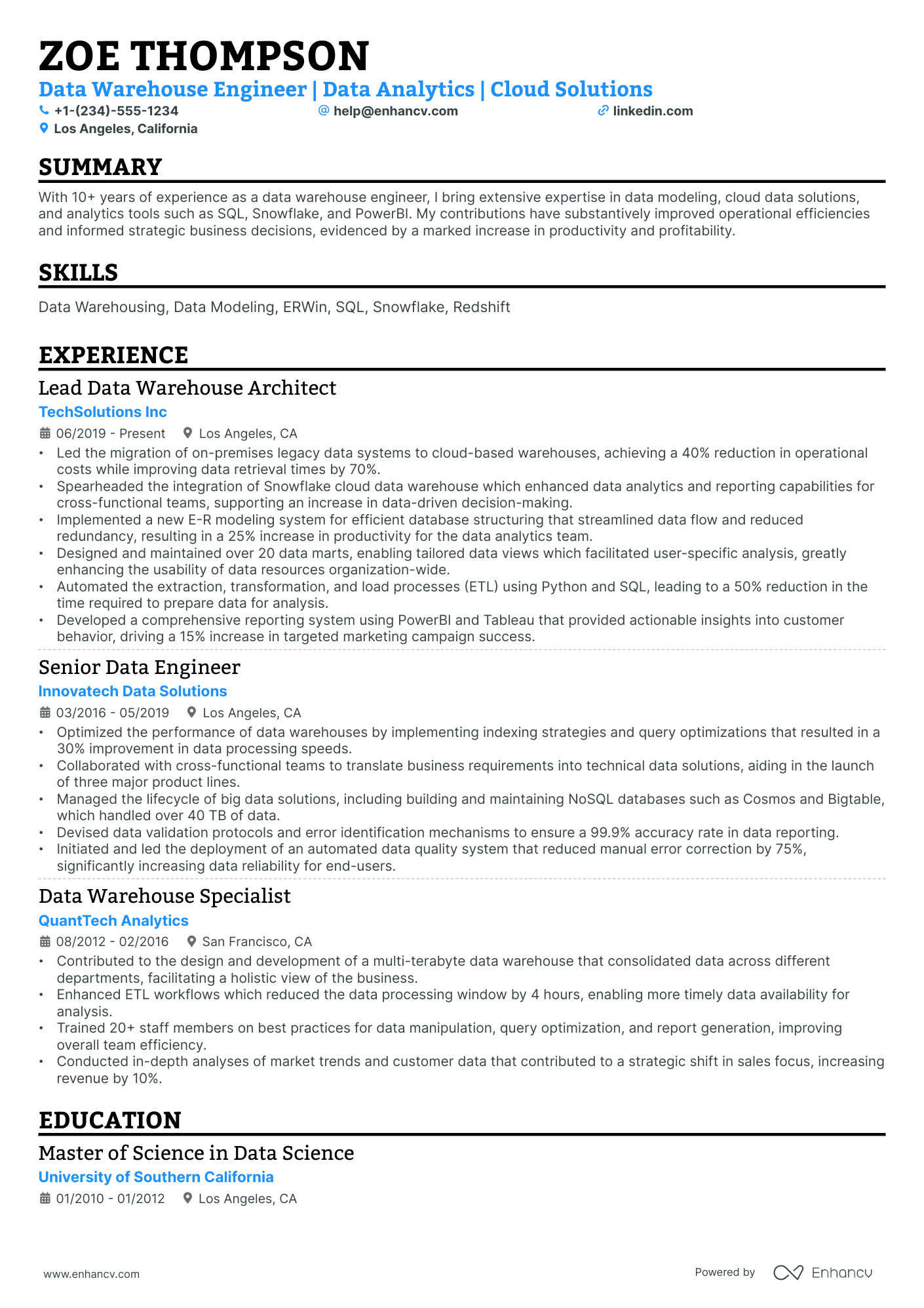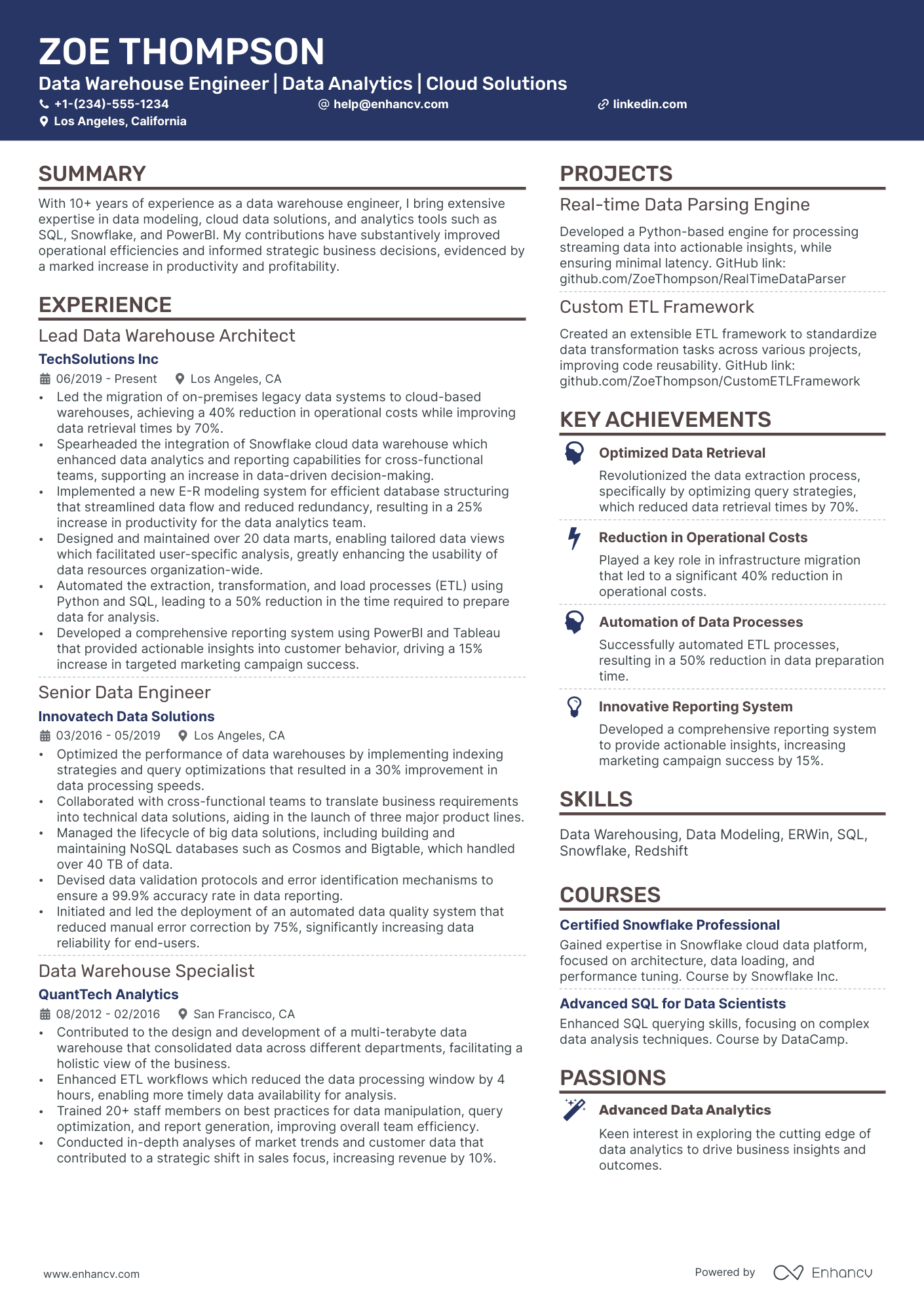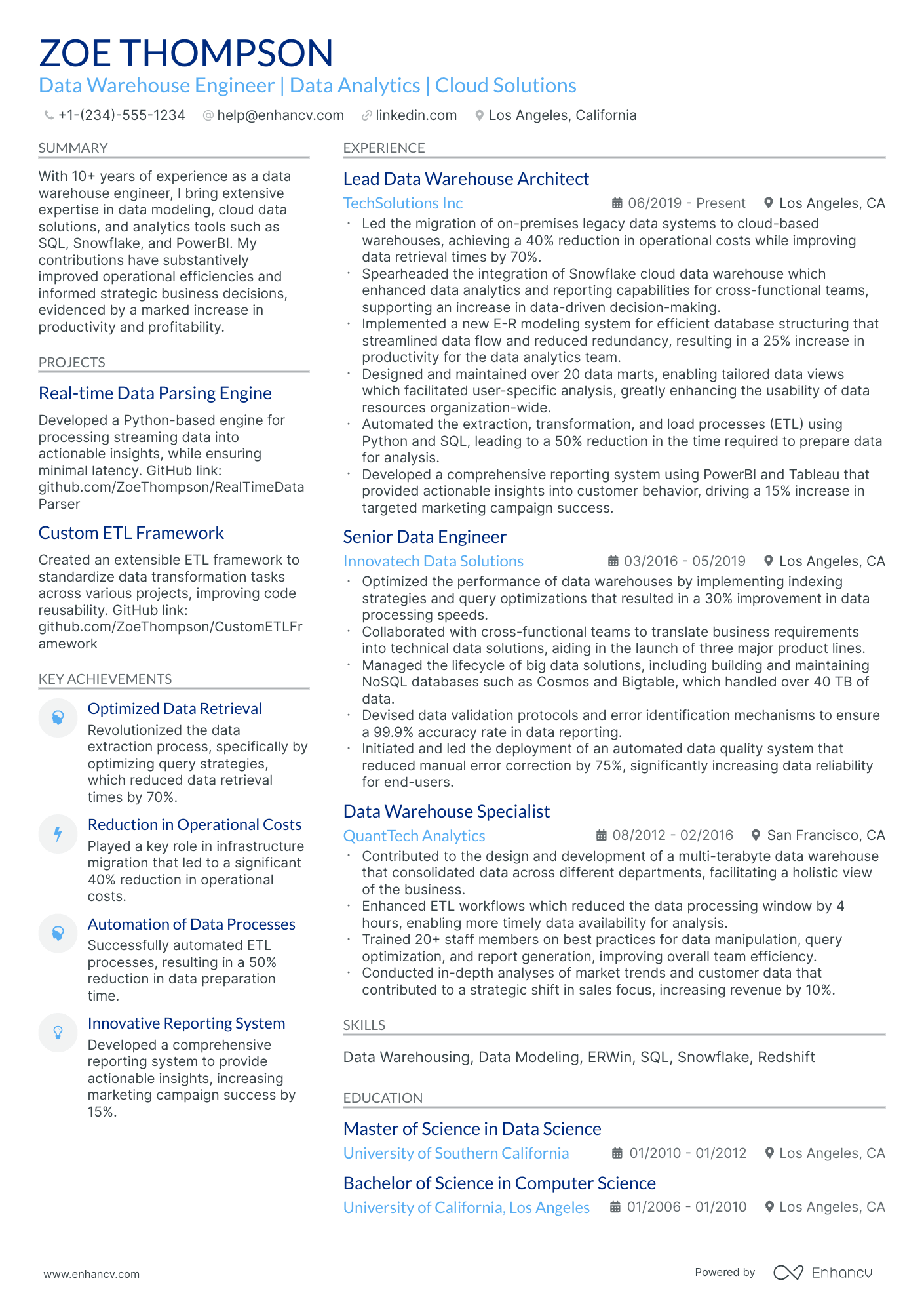As a data warehouse engineer, articulating the complexity of the projects you've managed and the impact they've had can be a daunting resume challenge. Our guide provides tailored strategies to help you succinctly highlight your achievements and the sophisticated data solutions you've implemented, ensuring your resume stands out to potential employers.
- Data warehouse engineer resume samples that got people hired at top companies.
- How to perfect the look-and-feel of your resume layout.
- How to showcase your achievements and skills through various resume sections.
- How you could hint to recruiters why your resume is the ideal profile for the job.
If the data warehouse engineer resume isn't the right one for you, take a look at other related guides we have:
- Data Center Engineer Resume Example
- Data Warehouse Architect Resume Example
- Database Architect Resume Example
- Data Manager Resume Example
- Azure Data Engineer Resume Example
- Data Entry Analyst Resume Example
- Data Warehouse Consultant Resume Example
- Enterprise Data Architect Resume Example
- Data Center Technician Resume Example
- Clinical Data Analyst Resume Example
Simple guide to your data warehouse engineer resume format and layout
Successful data warehouse engineer resumes all have one specific characteristic - candidates have invested in a simple resume layout . One that is easy to read, makes a good first impression, and is adapted to their professional experience. There are three distinct resume formats to help you focus on your:
- professional experience - use the reverse-chronological resume format;
- skills and achievements - via the functional skill-based resume format;
- both experience and skills - with a hybrid resume format .
What is more, keep in mind that your resume may be initially assessed by the ATS (Applicant Tracker System) (or the software used by companies in the hiring process). The data warehouse engineer resumes that suit the ATS:
- have a header that includes either a role keyword or the job you're applying for;
- should be no longer than two pages;
- be submitted as PDF, unless specified otherwise.
Customize your resume for the market – a Canadian format, for example, might vary in structure.
Upload & Check Your Resume
Drop your resume here or choose a file. PDF & DOCX only. Max 2MB file size.
PRO TIP
Showcase any ongoing or recent educational efforts to stay updated in your field.
Essential sections that should make up your data warehouse engineer resume include:
- The header - with your contact details (e.g. email and telephone number), link to your portfolio, and headline
- The summary (or objective) - to spotlight the peaks of your professional career, so far
- The experience section - with up to six bullets per role to detail specific outcomes
- The skills list - to provide a healthy mix between your personal and professional talents
- The education and certification - showing your most relevant degrees and certificates to the data warehouse engineer role
What recruiters want to see on your resume:
- Proficiency in data warehouse technologies (e.g., Amazon Redshift, Snowflake, Teradata, or Oracle Exadata).
- Experience with ETL (Extract, Transform, Load) processes, and familiarity with ETL tools such as Informatica, Talend, or DataStage.
- Strong knowledge of SQL and database programming, including writing complex queries and optimizing database performance.
- Understanding of data modeling concepts, star schema, and snowflake schema design for data warehousing.
- Familiarity with BI tools and reporting software (e.g., Tableau, Power BI, or Looker) for delivering data insights.
Adding your relevant experience to your data warehouse engineer resume
If you're looking for a way to show recruiters that your expertise is credible, look no further than the resume experience section.
Your data warehouse engineer resume experience can be best curated in a structured, bulleted list detailing the particulars of your career:
- Always integrate metrics of success - what did you actually achieve in the role?
- Scan the data warehouse engineer advert for your dream role in search of keywords in the job requirements - feature those all through your past/current experience;
- Dedicate a bullet (or two) to spotlight your technical capabilities and how you're able to use the particular software/technology in your day-to-day roles;
- Write simple by including your responsibility, a job advert keyword or skill, and a tangible outcome of your success;
- Use the experience section to also define the unique value of working with you in the form of soft skills, relevant feedback, and the company culture you best thrive in.
Industry leaders always ensure that their resume experience section offers an enticing glimpse at their expertise, while telling a career narrative. Explore these sample data warehouse engineer resumes on how to best create your resume experience section.
- Led a team to design and implement a data warehousing solution using AWS Redshift, achieving a 30% reduction in data retrieval times for analytics.
- Managed the migration of 10+ terabytes of company data from legacy databases to a new, scalable data warehouse, resulting in enhanced data integrity and accessibility.
- Developed complex ETL processes using Apache NiFi, increasing data processing efficiency by 40% while ensuring zero data loss during transfer.
- Implemented real-time data streaming architecture using Apache Kafka, thereby reducing data latency to under 5 minutes for critical business operations.
- Optimized data warehouse SQL queries, achieving a 25% boost in query performance and supporting more concurrent users on the platform.
- Collaborated with cross-functional teams to integrate third-party data sources, enhancing the diversity and volume of data for company-wide decision-making.
- Spearheaded the data modeling and warehouse schema design for a financial services provider, substantially improving report generation speed by 50%.
- Implemented an automated data quality framework that flagged and resolved 95% of data inconsistency issues without manual intervention.
- Coordinated with business analysts to align data warehousing strategy with organizational KPIs, directly supporting a 15% increase in revenue.
- Conducted a full-scale optimization of OLAP cubes which enhanced the financial reporting times by 35% for end-users in the finance department.
- Pioneered the adoption of columnar storage and data partitioning techniques, leading to a marked improvement in I/O efficiency for large datasets.
- Facilitated the transformation of business requirements into technical specifications for data warehousing projects, meeting the strategic objectives.
- Designed and deployed a scalable data warehouse using Microsoft SQL Server Integration Services, serving over 500 users within the organization.
- Crafted and executed a comprehensive backup and disaster recovery plan for the data warehouse, dramatically reducing potential data recovery times.
- Initiated and led the successful integration of geospatial data into the data warehouse, providing insightful analytics for the marketing team's campaigns.
- Developed a multi-cloud data warehousing solution that incorporated data from Azure and GCP, providing a more robust analysis environment for data scientists.
- Authored a data governance policy which streamlined data management practices and was adopted across the organization, reinforcing compliance with regulatory standards.
- Orchestrated a company-wide training program on the use and maintenance of the data warehouse, improving the technical skill set of the IT department.
- Optimized ETL workflows using Python and Apache Airflow, leading to a 60% increase in the speed of data pipeline executions.
- Deployed machine-learning models into production by constructing datasets curated and transformed in the data warehouse, directly impacting predictive analysis capabilities.
- Pioneered the first cloud-native data warehousing project in the company, which later served as a template for subsequent data infrastructure endeavours.
- Designed an automated monitoring system for data warehouse operations that decreased false alerts by 80% and improved system reliability.
- Regularly collaborated with the BI team to ensure that the data warehouse structure aligned with the evolving needs of business intelligence reporting.
- Established a cross-replication setup for the data warehouses that significantly diminished risks of data loss and supported a 99.99% uptime SLA.
- Introduced advanced data partitioning and indexing strategies that reduced nightly batch processing times from twelve hours to six hours.
- Created a set of best practices for the development team which improved the data load and extraction process efficiency by 20%.
- Generated ad-hoc and periodic reports to assist senior management in strategic planning, resulting in the identification of cost-saving opportunities in logistics.
- Played a key role in building a data warehousing solution that supported the e-commerce platform's scaling from 10,000 daily transactions to 50,000.
- Streamlined the multi-source data integration process with a custom ETL framework, which was later standardized for similar projects company-wide.
- Actively participated in strategic data warehouse planning sessions, which were critical in the development of a five-year technology roadmap.
The following content includes information from "O*NET OnLine" by the U.S. Department of Labor, Employment and Training Administration (USDOL/ETA). Used under the CC BY 4.0 license. The data represents the top responsibilities present on the task lists for data warehouse engineer professionals.
Top Responsibilities for Data Warehouse Engineer:
- Develop data warehouse process models, including sourcing, loading, transformation, and extraction.
- Verify the structure, accuracy, or quality of warehouse data.
- Map data between source systems, data warehouses, and data marts.
- Develop and implement data extraction procedures from other systems, such as administration, billing, or claims.
- Design and implement warehouse database structures.
- Develop or maintain standards, such as organization, structure, or nomenclature, for the design of data warehouse elements, such as data architectures, models, tools, and databases.
- Provide or coordinate troubleshooting support for data warehouses.
- Write new programs or modify existing programs to meet customer requirements, using current programming languages and technologies.
- Design, implement, or operate comprehensive data warehouse systems to balance optimization of data access with batch loading and resource utilization factors, according to customer requirements.
- Perform system analysis, data analysis or programming, using a variety of computer languages and procedures.
Quantifying impact on your resume
- Document the volume of data you've managed, specifying total terabytes or petabytes, to identify your capacity to handle large-scale data operations.
- Highlight the number of database migrations or integrations you have successfully completed to exhibit your experience with complex data processes.
- Indicate the percentage of query performance improvements you have achieved through optimizations to demonstrate your efficiency in data processing.
- Mention any cost savings in percentage or dollar terms you've identified through data warehousing solutions to showcase your impact on reducing operational expenses.
- Specify the number of reports and dashboards you’ve developed, underscoring your ability to translate data into actionable business insights.
- Quantify the decrease in data processing time due to improvements or automations you've implemented to illustrate your contributions to productivity.
- List the number of data sources you’ve integrated, emphasizing your skills in bringing disparate data together for a holistic analysis.
- Note the increase in data accuracy or reduction in data errors in percentage after implementing data quality initiatives to display your commitment to data integrity.
Action verbs for your data warehouse engineer resume
What can candidates do about their resume, if they have no experience
Job requirements can sometimes be answered by other elements you could make more prominent in your data warehouse engineer resume.
Thus, you'd be substituting your lack of experience with your relevant:
- Education with details of skills you've obtained that align with the job
- Internships and short-term jobs that are once more dedicated to putting your expertise in the spotlight
- Skills section answering basic and - potentially - more specific job qualifications
- Strengths or accomplishments to show the unique value you present, even as a candidate with less or no professional experience in the industry.
Recommended reads:
PRO TIP
List your educational qualifications and certifications in reverse chronological order.
Data warehouse engineer resume skills section: writing about your hard skills and soft skills
Recruiters always care about the skill set you'd bring about to the data warehouse engineer role. That's why it's a good idea to curate yours wisely, integrating both hard (or technical) and soft skills. Hard skills are the technology and software you're apt at using - these show your suitability for the technical aspect of the role. They are easy to track via your experience, certifications, and various resume sections. Your soft skills are those personality traits you've gained over time that show how you'd perform in the specific team, etc. Soft skills are more difficult to qualify but are definitely worth it - as they make you stand out and show your adaptability to new environments. How do you build the skills section of your resume? Best practices point that you could:
- Include up to five or six skills in the section as keywords to align with the advert.
- Create a specific technical skills section to highlight your hard skills aptitude.
- Align the culture of the company you're applying to with your soft skills to determine which ones should be more prominent in your skills section.
- Make sure you answer majority of the job requirements that are in the advert within your skills section.
A data warehouse engineer's resume requires a specific skill set that balances both industry-specific hard skills with personal, soft skills. Discover the perfect mix for the data warehouse engineer role from our list:
Top skills for your data warehouse engineer resume:
SQL
ETL Tools (e.g., Talend, Informatica)
Data Modeling
Data Warehousing Concepts
Cloud Platforms (e.g., AWS, Azure, Google Cloud)
Database Management Systems (e.g., Oracle, SQL Server, MySQL)
Big Data Technologies (e.g., Hadoop, Spark)
Data Visualization Tools (e.g., Tableau, Power BI)
Data Integration Techniques
Performance Tuning
Problem Solving
Analytical Thinking
Communication
Team Collaboration
Attention to Detail
Time Management
Adaptability
Critical Thinking
Project Management
Creativity
Next, you will find information on the top technologies for data warehouse engineer professonals from "O*NET OnLine" by the U.S. Department of Labor, Employment and Training Administration (USDOL/ETA). Used under the CC BY 4.0 license.
Top technologies for Data Warehouse Engineer’s resume:
- Amazon DynamoDB
- Oracle PL/SQL
- Microsoft PowerPoint
- Informatica software
- Quest Erwin Data Modeler
PRO TIP
The more time and effort you've put into obtaining the relevant certificate, the closer to the top it should be listed. This is especially important for more senior roles and if the company you're applying for is more forward-facing.
Listing your education and certifications on your data warehouse engineer resume
Don't underestimate the importance of your resume education section . As it may hint at various skills (and experience) that are relevant to the job. When writing your education section:
- Include only higher education degrees with information about the institution and start/end dates
- If you're in the process of obtaining your degree, include your expected graduation date
- Consider leaving off degrees that aren't relevant to the job or industry
- Write a description of your education if it presents you with an opportunity to further showcase your achievements in a more research-focused environment
When describing your certifications on your resume, always consider their relevancy to the role. Use the same format to describe them as you would for your education. If you're wondering what the best certificates out there are for data warehouse engineer roles, check out the list below.
The top 5 certifications for your data warehouse engineer resume:
- Certified Data Management Professional (CDMP) - DAMA International
- IBM Certified Designer: IBM Cognos Analytics Data Architectures V11 (IBM Certified Designer) - IBM
- Microsoft Certified: Azure Data Engineer Associate (Azure Data Engineer Associate) - Microsoft
- Oracle Business Intelligence Certification (Oracle BI Certification) - Oracle
- Certified Business Intelligence Professional (CBIP) - Transforming Data with Intelligence (TDWI)
The content below includes information from "O*NET OnLine" by the U.S. Department of Labor, Employment and Training Administration (USDOL/ETA). Used under the CC BY 4.0 license. The data represents the top associations for data warehouse engineer professionals.
Top US associations for a Data Warehouse Engineer professional
- Higher Education Data Warehousing
- Association for Computing Machinery
- Association for Information Science and Technology
- Association for Information Systems
- Association for the Advancement of Artificial Intelligence
PRO TIP
If the certificate you've obtained is especially vital for the industry or company, include it as part of your name within the resume headline.
Recommended reads:
Should you write a resume summary or an objective?
No need to research social media or ask ChatGPT to find out if the summary or objective is right for your data warehouse engineer resume.
- Experienced candidates always tend to go for resume summaries. The summary is a three to five sentence long paragraph that narrates your career highlights and aligns your experience to the role. In it you can add your top skills and career achievements that are most impressive.
- Junior professionals or those making a career change, should write a resume objective. These shouldn't be longer than five sentences and should detail your career goals . Basically, how you see yourself growing in the current position and how would your experience or skill set could help out your potential employers.
Think of both the resume summary and objective as your opportunity to put your best foot forward - from the get go - answering job requirements with skills.
Use the below real-world data warehouse engineer professional statements as inspiration for writing your resume summary or objective.
Resume summaries for a data warehouse engineer job
- Seasoned data warehouse engineer with 8 years of experience in consolidating vast data sets into coherent, actionable intelligence. Proficient in ETL processes, SQL, and database optimization, with notable success in redesigning the data platform for Acme Corp leading to a 30% increase in performance.
- Accomplished software developer making a strategic transition to data warehousing, bringing a solid 5-year background in full-stack development, comprehensive knowledge of Python and database management, and a track record of successful project management at WebGen Solutions.
- Aspiring data warehouse engineer with an advanced degree in Computer Science and a passion for big data and analytics. Eager to apply foundational knowledge of machine learning algorithms and data normalization techniques to assist in transforming raw data into strategic insights.
- Dedicated Business Analyst seeking to pivot into data warehousing, armed with 6 years of experience in data analytics, a strong grasp of statistical methods, and a proven history of delivering data-driven insights that drove a 20% revenue increase for StartUp Innovations.
- Eager to leverage academic training from MIT in Data Science and hands-on experience with cloud services like AWS and Azure to develop advanced data warehousing solutions that enhance informed decision-making capacities.
Average salary info by state in the US for data warehouse engineer professionals
Local salary info for Data Warehouse Engineer.” Source: My Next Move, National Center for O*NET Development. Accessed 10/15/2024
| State | Average Salary (in USD) |
|---|---|
| US National Average | $134,700 |
| California (CA) | $162,250 |
| Texas (TX) | $138,090 |
| Florida (FL) | $123,960 |
| New York (NY) | $142,230 |
| Pennsylvania (PA) | $125,790 |
| Illinois (IL) | $128,990 |
| Ohio (OH) | $127,230 |
| Georgia (GA) | $155,210 |
| North Carolina (NC) | $125,860 |
| Michigan (MI) | $122,700 |
Miscellaneous data warehouse engineer resume sections for a more personalized approach
Your data warehouse engineer resume can reflect even more upon your personality and best qualities - that is if you decide on including a couple of additional resume sections to support your application.
Some of the best-accepted industry-wide choices include the:
- Resume projects - getting into the outcomes of your most important work, so far;
- Languages on your resume - detailing your proficiency level;
- Special recognitions - dedicated to your most prominent industry awards;
- Hobbies and interests - defining how you spend your free time.
Key takeaways
- The layout of your resume should take into consideration your professional background while integrating vital sections and design elements;
- Highlight your most pertinent achievements for the role all through different sections;
- Be very specific when selecting your certifications, hard skills, and soft skills to showcase the best of your talents;
- Include within the top one-third of your data warehouse engineer resume a header and summary to help recruiters understand your experience and allocate your contact details. A skills box is optional, but it will help you align your expertise with the role;
- Detail the full extent of your professional experience with specific bullets that focus on tasks, actions, and outcomes.
